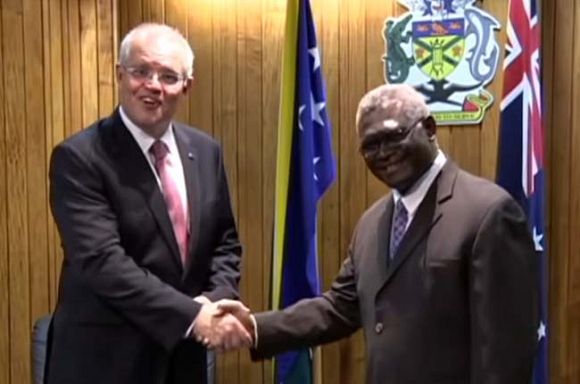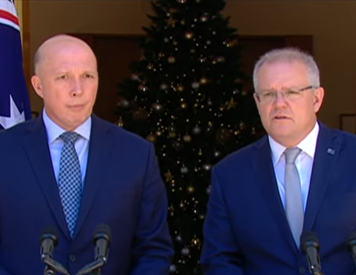The Coalition's fumbling of foreign policy has resulted in a dangerous display of bravado as tensions escalate over the China/Solomon Islands security agreement, writes Bruce Haigh.
PLANS FOR A security agreement between China and the Solomon Islands were leaked to the media last week. The intention to sign an agreement has been initialled by the two countries. The proposal has put the cat amongst the pigeons.
Anti-China rhetoric had already been running high over Ukraine, with claims from conservatives in the U.S. and Australia that the Russian invasion would encourage China to think of invading Taiwan. They were particularly exercised by the refusal of China to publicly condemn the invasion. So, when it was announced that China was entering a security arrangement with the Solomons, the level of hysteria rose accordingly.
Speculation ran rife. The security agreement quickly morphed into the construction of a naval facility and harbour. The Commander of the U.S. Pacific Fleet, Admiral Samuel Paparo, said he was gravely concerned and Australian military and political leaders voiced the same concern.
More sober analysts say the construction of a Chinese base is unlikely. Australia is already building a Patrol Boat base in Lofung in the Shortland Islands near Papua New Guinea and there are plans to build another in the eastern Solomon Islands.
Observers might be forgiven for linking the announcement of AUKUS to the establishment of the China/Solomons security agreement — such is the build-up of suspicion between the AUKUS partners and China. Further fuelled by an announcement, seemingly timed to coincide with knowledge of the agreement, that AUKUS would build hypersonic rockets. The announcement was petrol on the fire.
The U.S. is pushing hard against China, just as it did with NATO and the East European states against Russia. The U.S. is obsessed with being in control which has led in the past to overreach. The fear is that the U.S. wants to push China into acting precipitately so that from a “small” military confrontation it can assert and re-establish its former dominance. It needs to be called out.
At the moment, there is too much posturing and not enough talking. If Australia and China had a better and more secure relationship, plans for the Pacific might be discussed between themselves, New Zealand and the major stakeholders — the Pacific Island states.
Threatening talk and hairy-chested tub-thumping are not conducive to the resolution of tension which if allowed to escalate, might well turn into conflict. In confronting the U.S., China needs to act with the maturity and confidence that America lacks. It needs to claim the diplomatic high ground with adroit statesmanship.
As a sovereign state, the Solomon Islands can make decisions and determinations about the security of the country and the well-being of its people.
Patronising arrogance might best describe the attitude of the ruling L-NP in Australia toward Pacific Island states and their people. A view formed within their racism. It is insulting for Australia to use the term “Pacific family” when there is little respect or meaning behind it and when it is not reciprocated.
Australia has had a long association with the Solomons including through the Regional Assistance Mission to the Solomon Islands (RAMSI) and the deployment last year of 200 army and police personnel to restore order following riots. It has allocated millions to development projects, including a radio network, apparently to little effect.
Underlying grievances centred on bruised sensitivities and insults, real or perceived, have apparently been fertile ground for the Solomons to seek security arrangements with the CCP.
Apparently, the agreement will allow China to deploy military and police to maintain law and order and protect “Chinese personnel and major projects”. This is potentially a problem for China as it could be asked to prop up an unpopular government. In the Solomons at the moment, there is little opportunity for the public to debate policy. The Government is becoming more closed and removed from the people.
Australia is very unsettled at the moment as it moves toward an Election in about six weeks’ time. There may well be a change of government offering an opportunity for Australia and China to sit down and discuss some of the outstanding issues affecting the relationship, including the South Pacific.
At some point in the not-too-distant future, China and America need to hold high-level talks on climate warming and the fragile state of international security. It would not hurt for China to take the initiative.
Bruce Haigh is a political commentator and retired diplomat.
Related Articles
- Australia losing Pacific grip as China makes deal with Solomons
- Australia’s 'war' with China: featherweight versus heavyweight
- Australia should stand by Tibet's side, not shun it
- Labor could be key to a better relationship with China
- Diplomacy dies on the dung-hill of Australia-China relations
 This work is licensed under a Creative Commons Attribution-NonCommercial-NoDerivs 3.0 Australia License
This work is licensed under a Creative Commons Attribution-NonCommercial-NoDerivs 3.0 Australia License
Support independent journalism Subscribe to IA.














